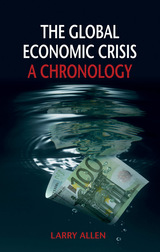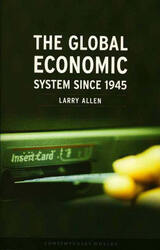3 books about Allen, Larry

The Global Economic Crisis
A Chronology
Larry Allen
Reaktion Books, 2013
From Greece scrambling to meet Eurozone austerity measures to America’s sluggish job growth, there is every indication that the world has not recovered from the economic implosion of 2008. And for many of us, the details of what led to the recession—and why it has continued—remain murky. Economic historian Larry Allen clears up the subject in The Global Economic Crisis, offering an insightful and nonpartisan chronology of events and their consequences. Illuminating the interlocked economic processes that lay beneath the crisis, he analyzes the changing nature of the global financial system, central bank policies, housing bubbles, deregulation, sovereign debt crises, and more.
Allen begins the timeline with the economic crisis in Japan in the late 1990s, asking whether Japan’s experience could be an indicator of the outcome of the recession and what it can teach us about managing a sluggish economy. He then takes a comparative look at the economies of Brazil, China, and India. Throughout, he argues that many elements have contributed to the ongoing crisis, including the introduction of the euro, the growth of new financial instruments such as securitization, collateralized debt obligations and credit default swaps, interest rate policies, and the housing boom and subprime mortgage fiasco.
Lucid and informative, The Global Economic Crisis provides an impartial explanation to anyone seeking to understand the current state—and future—of the world’s economy.
[more]

The Global Economic System since 1945
Larry Allen
Reaktion Books, 2005
The strictly mathematical foundation of conventional economic theories has resulted in circumscribed analyses of world economic history. Larry Allen's groundbreaking The Global Economic System since 1945, in contrast, re-evaluates world economic history in a context that recognizes and avoids the inherent limitations of mathematical models.
The Global Economic System since 1945 does not shun economic theory, but rather uses it as a tool to reassess recent world economic history. Allen describes how, starting at the end of World War Two, powerful corporations lobbied governments in an effort to reduce the perceived constraints of regulation. In the past twenty-five years these voices have grown increasingly influential, as governments worldwide adopted free-market policies, reduced economic regulation, and promoted the virtues of free-market capitalism.
The Global Economic System since 1945 presents a fresh and wide-ranging synthesis of economic history and theory that will be valuable to both scholars and curious participants in today's global economy.
The Global Economic System since 1945 does not shun economic theory, but rather uses it as a tool to reassess recent world economic history. Allen describes how, starting at the end of World War Two, powerful corporations lobbied governments in an effort to reduce the perceived constraints of regulation. In the past twenty-five years these voices have grown increasingly influential, as governments worldwide adopted free-market policies, reduced economic regulation, and promoted the virtues of free-market capitalism.
The Global Economic System since 1945 presents a fresh and wide-ranging synthesis of economic history and theory that will be valuable to both scholars and curious participants in today's global economy.
[more]

Global Financial System 1750-2000
Larry Allen
Reaktion Books, 2001
This book traces the evolution of the highly integrated global financial system from 1750 to the present. It examines the corporate form of business organization in the 18th century that saw an explosion of growth in the 19th, which facilitated the international movement of capital. The author also deals with the parallel growth of financial markets and explains how the need to finance public debts paved the way for stock markets as well as outlining the role of private merchant bankers, who originated as international bankers with family-run offices across Europe. He charts the development of banks into public corporations and follows the evolution of modern paper money, explaining the emergence of institutions such as the International Monetary Fund and the World Bank. While tracing the development of foreign-exchange markets and the history of trading blocs, the book also examines how economic powers such as Britain and France used access to capital to wield power in less-developed parts of the world. Finally, a history of financial crises is presented, revealing how economic shocks reverberate from one country to another today through the global financial network.
[more]
READERS
Browse our collection.
PUBLISHERS
See BiblioVault's publisher services.
STUDENT SERVICES
Files for college accessibility offices.
UChicago Accessibility Resources
home | accessibility | search | about | contact us
BiblioVault ® 2001 - 2024
The University of Chicago Press









